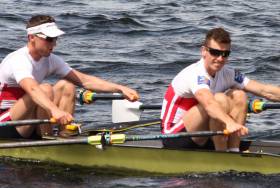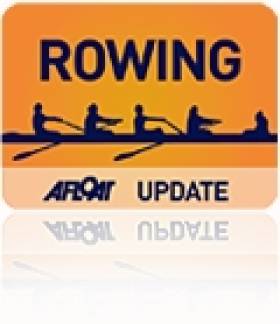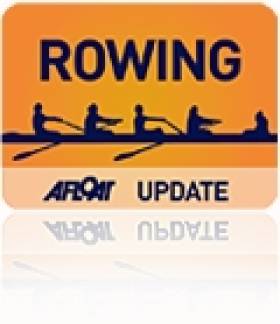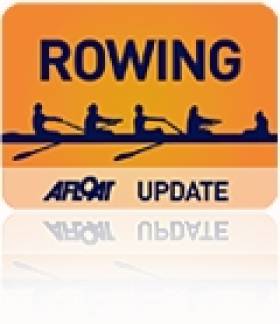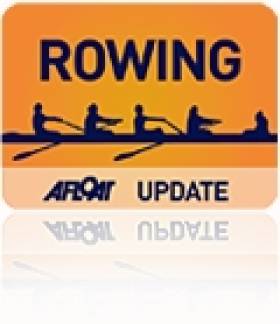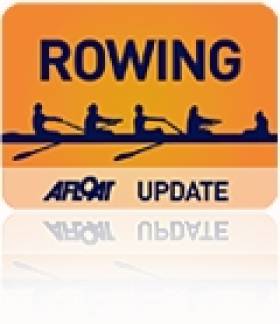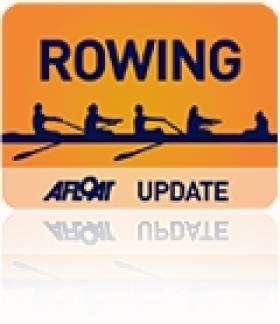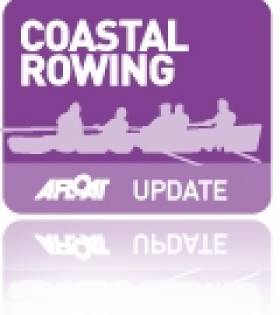Displaying items by tag: Irish Championships
#Rowing: Barry O’Flynn of Cork Boat Club came from behind to win the junior single sculls title at the Irish Rowing Championships in Cork today. Jack Dorney of Shandon tested the favourite in an exciting race – and went ahead. O’Flynn came back and won by a length.
Two of the top junior women were involved in impressive wins. Hannah Scott teamed up with Katie Shirlow to win the intermediate pairs for Bann, while Margaret Cremen and Aoife Lynch won the junior doubles.
NUIG won two sucessive finals, the women’s club coxed four and the men’s intermediate coxed four, while UCC had started the first session of finals at the Championships with a win in the novice coxed quadruple.
Skibbereen called on the class of their international brigade to also win twice: Paul and Gary O’Donovan were untested in their senior doubles win, while Denise Walsh stroked the women’s senior four to a fine win over UCD.
Irish Rowing Championships, National Rowing Centre, Day One (Selected Results)
Men
Four – Inter, coxed: NUIG 6:13.38.
Sculling, Quadruple – Novice, coxed: UCC 6:39.37.
Double – Senior: Skibbereen 7:06.89.
Single – Junior: Cork (B O’Flynn) 7:04.06.
Women
Four – Senior: Skibbereen 6:40.58. Club, coxed: NUIG 7:10.92.
Pair – Inter: Bann 7:19.32.
Sculling, Double – Junior: Lee 7:09.86.
Ireland Oarsmen the Afloat Rowers of the Month
#Rowing: The Rowers of the Month for July are Mark O’Donovan and Shane O’Driscoll of Skibbereen. The Irish Championships offered a list of great performances: the Commerical senior eight won a thrilling final; the Cork Boat Club junior pair of Amy Mason and Tara Hanlon impressed and would go on the take silver at the Coupe de la Jeunesse; the rising star that is Daire Lynch took three titles. However, O’Donovan and O’Driscoll had the outstanding run, taking five titles: together they won the senior pair and senior double, while O’Donovan won the senior single sculls and O’Driscoll the lightweight single. They also teamed up with Fintan McCarthy and Kenny McCarthy to win the senior quadruple. The combined efforts of all the Skibbereen crews brought them 13 titles, lifting the west Cork club to 163 in total, clear at the top of the rankings as the most successful Irish club.
Mark O’Donovan and Shane O’Driscoll will represent Ireland in the lightweight pair at the World Championships in Rotterdam in late August.
Rower of the Month awards: The judging panel is made up of Liam Gorman, rowing correspondent of The Irish Times, and David O'Brien, editor of Afloat magazine. Monthly awards for achievements during the year will appear on afloat.ie and the overall national award will be presented to the person or crew who, in the judges' opinion, achieved the most notable results in, or made the most significant contribution to rowing during 2016. Keep a monthly eye on progress and watch our 2016 champions list grow.
Lynch Has Terrific Win at Irish Rowing Championships
#Rowing: Two outstanding races brought the first session of the Irish Rowing Championships at the National Rowing Centre to a close today. Daire Lynch of Clonmel won the junior single sculls. He caught and passed Shandon's Ronan Byrne in the final quarter, but Byrne refused to give in easily and the two swept towards the finish line with a small margin separating them - Lynch won by just over four tenths of a second.
The junior women's double had a similar profile: Skibbereen hunted down and caught leaders Bann and held off their late charge to win by just over three tenths of a second.
UCD had a surprisingly emphatic win over a Skibbereen/UCC composite in the women's senior four - a first senior win for bow woman Eimear Lambe. In the men's double, Shane O'Driscoll and Mark O'Donovan were similarly impressive in their win over Old Collegians.
Neptune had started the session with their first Championships win in years, in the novice coxed quadruple. Fermoy won the women's Club coxed four, while Cork and NUIG won hte women's intermediate pair and men's intermediate coxed four respectively.
Irish Rowing Championships, National Rowing Centre, Cork, Day One (Selected Results)
Men
Four - Inter, coxed: 1 NUIG 6:26.811.
Sculling, Quadruple - Novice, coxed: Neptune 6:44.559.
Double - Senior: 1 Skibbereen 6:32.773, 2 UCD 6:34.914, 3 Castleconnell 6:39.727.
Single - Junior: 1 Clonmel (D Lynch) 7:04.040, 2 Shandon (R Byrne) 7:04.462, 3 Shandon (S O'Sullivan) 7:23.197.
Women
Four - Senior: 1 UCD 6:54.652, 2 Skibbereen/UCC 6:58.902, 3 Trinity 7:04.715. Club, coxed: Fermoy 7:16.116.
Pair - Intermediate: Cork 7:36.488
Sculling
Double - Junior: 1 Skibbereen B 7:19.682, 2 Bann 7:91.995, 3 Neptune 7:33.305.
Trinity are Senior Eights Champions of Ireland
#ROWING: Trinity won the senior eights Championship of Ireland for the first time since 2008 at the National Rowing Centre today. They started well and pushed into a one-length lead at 1,000 metres over UCD/Old Collegians, with NUIG/Grainne Mhaol not far behind. Trinity saw off repeated pushes to win by just under a length from UCD/Old Collegians.
In the women’s senior eights UCD had a similar race pattern, but had a little more to spare over their rivals, UCC/Skibbereen and Trinity.
The men’s intermediate double gave Garda’s Damien Kelly and Ronan Allen a chance to impress. They dominated their race, as did Skibbereen in the women’s junior quadruple sculls – a win which brought Skibbereen up to 150 wins and level with Neptune on the Pots won at the Irish Championships. Fittingly, Aoife and Niamh Casey, daughters of Dominic Casey, were in the winning boat.
Dervla Forde won the women’s intermediate single sculls title – after a fine battle with Sarah Quinn of Belfast Boat Club, while Portora finished off a good Championships for them with wins in the men’s junior pair and women’s club eight.
Irish Rowing Championships, National Rowing Centre, Cork, Day Three (Selected results)
Men
Eight – Senior: 1 Trinity (G Mahon, I Hurley, J Magan, M Corcoran, P Moreau, M Kelly, L Hawkes, D Butler; cox: C Flynn) 5 mins 37.45 seconds, 2 UCD/Old Collegians 5:40.41, 3 NUIG/Grainne Mhaol 5:42.05, 4 UCC/Presentation 5:56.76.
Four – Club, coxed: 1 Queen’s 6:28.23, 2 UCD A 6:30.77, 3 NUIG A 6:36.48.
Pair – Intermediate: 1 Commercial A 6:47.94, 2 Skibbereen 6:55.20, 3 Portora 7:00.19. Junior: 1 Portora B 6:56.46, 2 St Joseph’s A 6:58.25, 3 Portora A 7:04.65.
Sculling, Double – Intermediate: 1 Garda 6:49.10, 2 Lee 6:41.24, 3 Waterford 6:42.64. Junior: 1 Shandon 6:40.27, 2 Castleconnell A 6:50.48, 3 Cork BC B 6:55.56.
Lightweight Single: 1 Skibbereen (J Ryan) 7:09.17, 2 Skibbereen (McCarthy) 7:12.63, 3 St Michael’s (D O’Connor) 7:15.40.
Women
Eight – Senior: 1 UCD (D Callanan, R Gilligan, C Harrison, B Larsen, O Finnegan, A Crowley, A O’Riordan, K O’Connor; cox: L Mulvihill) 6:25.85, 2 UCC/Skibbereen 6:30.31, 3 Trinity A 6:31.62. Club: 1 Portora 6:41.27, 2 Commercial A 6:46.19, 3 NUIG 6:47.67.
Four – Intermediate, coxed: 1 NUIG 7:09.66, 2 Commercial 7:18.28, 3 Shannon 7:23.16.
Pair – Junior: 1 Bann 7:42.60, 2 Portora 7:47.30, 3 Lee 7:51.35.
Sculling, Quadruple – Junior: 1 Skibbereen 6:50.32, 2 Bann A 6:57.37, 3 Bann B 6:59.29.
Single – Lightweight: 1 Tribesmen (S McCrohan) 7:46.48, 2 Commercial (Sarah Dolan) 7:50.22, 3 Skibbereen (O Hayes) 8:00.39. Intermediate: 1 Cork (D Forde) 7:50.85, 2 Belfast BC (S Quinn) 7:51.99, 3 Belfast BC (Mulligan) 8:00.32.
Skibbereen and Tribesmen Best of Irish Lightweights
#Rowing: Justin Ryan and Siobhan McCrohan took the lightweight single sculls titles at the Irish Rowing Championships today. The Skibbereen man and Tribesmen woman were commanding winners. McCrohan had already won the senior singles title, while Ryan was taking his second consecutive lightweight title at the National Rowing Centre. Last year he represented UCC.
Two crews won by taking early command of their races. Colm Hennessy and Ronan Byrne in the Shandon junior double and the Commercial intermediate pair of Colm Dowling and Neil Gahan gauged the tailwind well and used it to back up their good starts.
NUIG also won the women’s intermediate coxed four well, and Bann’s Hannah Scott and Katie Shirlow, added the junior pair to their junior fours crown.
Queen’s took the club coxed four, having already won the club eight. They held off UCD’s challenge in the closing stages.
Irish Rowing Championships, National Rowing Centre, Cork, Day Three (Selected results)
Men
Four – Club, coxed: 1 Queen’s 6:28.23, 2 UCD A 6:30.77, 3 NUIG A 6:36.48.
Pair – Intermediate: 1 Commercial A 6:47.94, 2 Skibbereen 6:55.20, 3 Portora 7:00.19.
Sculling, Double – Junior: 1 Shandon 6:40.27, 2 Castleconnell A 6:50.48, 3 Cork BC B 6:55.56.
Lightweight Single: 1 Skibbereen (J Ryan) 7:09.17, 2 Skibbereen (McCarthy) 7:12.63, 3 St Michael’s (D O’Connor) 7:15.40.
Women
Four – Intermediate, coxed: 1 NUIG 7:09.66, 2 Commercial 7:18.28, 3 Shannon 7:23.16.
Pair – Junior: 1 Bann 7:42.60, 2 Portora 7:47.30, 3 Lee 7:51.35.
Sculling, Single – Lightweight: 1 Tribesmen (S McCrohan) 7:46.48, 2 Commercial (Sarah Dolan) 7:50.22, 3 Skibbereen (O Hayes) 8:00.39.
McCrohan and UCD/Old Collegians Composite Win in Cork
#Rowing: Siobhan McCrohan won the won the women’s senior single sculls for Tribesmen and the experienced Old Collegians/UCD crew took the men’s senior quadruple at the Irish Championships this afternoon.
In the junior women’s eight, Portora had to see off a challenge by Bann, while Shandon bested Castleconnell in an exciting race to win the junior men’s quadruple – their third in-a-row.
Queen’s won the men’s novice eight, beating UCD and Trinity, while Margaret Cremin of Lee won the club single sculls and Andrew Goff of Waterford the men’s intermediate single.
Irish Rowing Championships, National Rowing Centre, Cork (Day Two, Selected Results)
Men
Eight – Intermediate: 1 Trinity 5:46.51, 2 UCD A 5:49.27, 3 Queen’s 6:08.61. Novice: 1 Queen’s 6:18.97, 2 UCD 6:25.66, 3 Trinity 6:38.63.
Four – Junior, coxed: 1 Portora 6:36.84, 2 St Joseph’s 6:37.0, 3 Athlunkard 6:45.18.
Pair – Senior: 1 UCC 7:03.18, 2 NUIG 7:10.16, 3 Carlow 7:12.51.
Sculling, Quadruple – Senior: 1 Old Collegians/UCD 6:07.97, 2 Commercial 6:14.51. Junior: 1 Shandon 6:16.78, 2 Castleconnell 6:17.49, 3 Cork BC A 6:28.24.
Single – Intermediate: 1 Waterford (A Goff) 7:23.95, 3 Athlone (P Munnelly) 7:34.43. Club: 1 Shandon (C Merz) 7:42.94, 2 Clonmel (D Lynch) 7:44.96, 3 Lee (D Larkin) 7:45.94.
Women
Eight – Novice: 1 Commercial 6:59.55, 2 Queen’s 7:13.67, 3 Trinity 7:13.67. Junior: 1 Portora 6:49.43, 2 Bann 6:52.99, 3 Shannon 7:13.95.
Sculling, Double – Intermediate: 1 Skibbereen 7:36.62, 2 St Michael’s 7:45.87, 3 Belfast BC 7:48.80.
Single – Senior: 1 Tribesmen (S McCrohan) 8:06.29, 2 Commercial (Sarah Dolan) 8:12.04, 3 Skibbereen (O Hayes) 8:13.99. Club: 1 Lee (M Cremin) 8:33.88, 2 Garda (J Ryan) 8:46.29, 3 Queen’s (R Brown) 8:51.52. Junior: 1 Cork (D Forde) 8:07.98, 2 Skibbereen (E Hegarty) 8:18.01, 3 Offaly (A Mooney) 8:21.91.
#Rowing: UCC’s Andy Harrington and David O’Leary won the men’s senior pairs title at the Irish Rowing Championships this morning. The young crew flew away from their opponents in the third quarter and won well from NUIG.
Trinity had a fine win in the men’s intermediate eights, finishing well under pressure from UCD, while Portora’s win in the men’s junior coxed four was even closer. They were caught by St Joseph’s of Galway coming up to the line, but pushed again and won – by .16 of a second.
The women’s races were won by clearer margins. Dervla Forde took the junior single sculls, Skibbereen’s Orla Hayes and Aoife Casey the intermediate double and Commercial the novice eights, all in impressive fashion.
Cathal Merz also led down the course to win the men’s club single sculls.
Irish Rowing Championships, National Rowing Centre, Cork (Day Two, Selected Results)
Men
Eight – Intermediate: 1 Trinity 5:46.51, 2 UCD A 5:49.27, 3 Queen’s 6:08.61.
Four – Junior, coxed: 1 Portora 6:36.84, 2 St Joseph’s 6:37.0, 3 Athlunkard 6:45.18.
Pair – Senior: 1 UCC 7:03.18, 2 NUIG 7:10.16, 3 Carlow 7:12.51.
Sculling, Single – Club: 1 Shandon (C Merz) 7:42.94, 2 Clonmel (D Lynch) 7:44.96, 3 Lee (D Larkin) 7:45.94.
Women
Eight – Novice: 1 Commercial 6:59.55, 2 Queen’s 7:13.67, 3 Trinity 7:13.67.
Sculling, Double – Intermediate: 1 Skibbereen 7:36.62, 2 St Michael’s 7:45.87, 3 Belfast BC 7:48.80.
Single – Junior: 1 Cork (D Forde) 8:07.98, 2 Skibbereen (E Hegarty) 8:18.01, 3 Offaly (A Mooney) 8:21.91.
NUIG/Grainne Mhaol and Keohane Win at Irish Championships
#Rowing: NUIG/Grainne Mhaol won the men’s senior four on the first day of the Irish Rowing Championships today. Alan Martin’s crew overtook long-time leaders Commercial and beat them by over two seconds at the National Rowing Centre. It was Martin’s 10th senior fours crown and his 21st championship.
John Keohane roared with relief after taking his fourth consecutive senior single sculls championship. He was tested coming up to the finish by Erik Rowan, but had built up a big lead and was able to win by over a second. Old Collegians won the men’s senior double by a big margin.
The women’s senior four went to Trinity and the senior pair to UCC. The men’s junior eight saw Portora tested by St Joseph’s of Galway, but the Enniskillen club prevailed. Patrick Munnelly of Athlone won the junior single.
Bann’s crew of Rebecca Meenagh, Erin Barry, Hannah Scott and Katie Shirlow won the women’s junior four by .36 of a second from fast-finishing Skibbereen.
Irish Rowing Championships, National Rowing Centre, Cork (Selected Results)
Men
Eight – Club: 1 Queen’s 6:03.62, 2 Cork BC 6:03.93, 3 UCD 6:08.53. Junior: 1 Portora 6:00.69, 2 St Joseph’s 6:03.82, 3 Bann 6:13.00.
Four – Senior: 1 NUIG/Grainne Mhaol 6:11.63, 2 Commercial 6:13.97, 3 UCC 6:21.35. Inter, coxed: 1 NUIG 6:41.64, 2 St Michael’s 6:44.03, 3 UCD 6:49.83.
Sculling, Quadruple – Novice, coxed: Commercial 7:38.90.
Double – Senior: 1 Old Collegians 6:59.99, 2 Garda 7:12.07, 3 St Michael’s 7:48.13.
Single – Senior: 1 Lee Valley (J Keohane) 7:15.02, 2 Skibbereen (E Rowan) 7:16.08, 3 Skibbereen (J Ryan) 7:18.78. Junior: 1 Athone (P Munnelly) 7:32.18, 2 Shandon (R Byrne) 7:34.19, 3 Bann (D Mitchell) 7:36.09.
Women
Eight – Intermediate: 1 UCD 6:40.99, 2 NUIG 6:55.31, 3 Garda 7:00.87.
Four – Senior: 1 Trinity 7:13.81, 2 UCC/Cork BC 7:17.54, 3 Skibbereen 7:45.50. Club, coxed: 1 NUIG 7:27.35, 2 Cork BC 7:37.45, 3 Queen’s A 7:43.13. Junior: 1 Bann 7:05.57, 2 Skibbereen 7:05.93, 3 St Michael’s 6:21.65.
Pair – Senior: 1 UCC 7:37.44, 2 Trinity 7:48.40, 3 Shannon A 7:52.21. Inter: 1 Shannon 8:00.04, 2 Cork BC 8:10.49, 3 UCC 8:12.14.
Sculling, Quadruple – Novice, coxed: 1 Fermoy 7:48.72, 2 NUIG 8:05.59, 3 Castleconnell 8:14.48.
Double – Junior: 1 Skibbereen 7:37.95, 2 Bann 7:44.66, 3 Lee A 7:51.45.
Irish Rowing Championships Draw Huge Entry
#Rowing: The 2015 Irish Rowing Championships will be held at the National Rowing Centre in Farran Wood, Cork from Friday 10th July to Sunday 12th July.
This year’s Championships features a mammoth entry of a total of 893 crews, with races running from 9am-5pm on Friday, 8:30am-6:30pm on Saturday and 8:30am-5pm on Sunday.
This event will attract over 3,000 competitors and approximately 10,000 spectators over the three day duration of the regatta and it is the premier domestic event of the rowing season.
The Championships are arguably Ireland's largest annual water sports event and are also the most significant All-Ireland sporting championship to be held annually in Cork. It promises to be a very exciting weekend of competitive rowing.
Coastal Rowing Championships Promise Weekend of Action and Fun
#COASTAL ROWING: The All Ireland Coastal Rowing Championships will take place on Lough Currane, Waterville, Co Kerry, this weekend. About 2,700 rowers will descent on the picturesque village of Waterville, which lies on the Iveragh Peninsula, with 530 crews competing for a medal and a trophy. The action starts today (Friday) at 4pm.
The Kerry Coastal Rowing Association hosts the event. There are over 20 coastal rowing clubs, involved in organising the extensive programme of rowing and entertainment. There are a 25 categories of rowing, from the Under 12s to Master/Veteran.
Mary B Teahan, the PRO of the Irish Coastal Rowing Federation, said: “This regatta is the biggest regatta in the country and promises to be full of passion, pride and fantastic competition, where the best in the country will come to take on the might of each other. It’s a celebration of rowing. Crews from Donegal, Antrim, Belfast, Dublin, Wicklow, Wexford, Cork, and Kerry, will battle it out on the water and be assured of best of Kerry craic during the event. It’s also a showcase of what this part of the Iveragh Peninsula has to offer, in terms of tourism and promotion of the Wild Atlantic Way ... it ticks all the boxes.”
The event begins with a blessing of the boats, today at 4pm … Then the real rowing action begins.
Teahan said: “The opening ceremony promises to be a taste of Kerry. a lot of effort and time been put in to prepare for this prestigious event with the coastal rowing clubs, fund raising throughout the winter. The board has driven the preparations forward with the local rowing clubs and GAA in Waterville all helping out for the weekend. There is nightly entertainment in the green in the village with an array of bands and music and our nominated charity kindly stewarding.”
The event charity is Recovery Haven cancer services.
Forty heats will be rowed on Saturday. The finals take place on Sunday. The organisers say the atmosphere will be like Croke Park on All-Ireland final day: club colours worn with pride, club support out in force, the intense rivalry, the referee’s decision, the photo finish, the factions, club picnics, and maybe the old splash of rain!
The type of boat used in the Coastal Rowing Championships is called a ‘One Design’ – a fibre glass boat, fixed seat, a crew of four and cox. Another fine showcase to watch out for is The Seine boat crews of Mid and South Kerry where a 12-man crew, with a cox, races 18 kilometres.


























